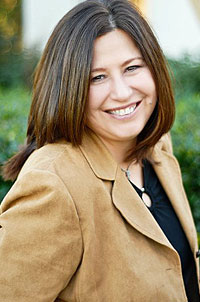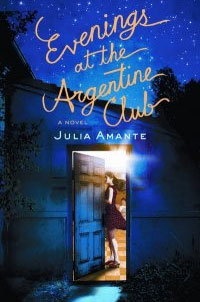This week, TheLatinoAuthor.com is featuring author Julia Amante. Ms. Amante grew up mostly in Southern California, but spent the first five years of her life in New York City. Ms. Amante’s life experiences and love of family, friends, and travel have helped her capture the essence of her writing genre and style; writing women’s fiction. It is this style that mesmerizes countless readers and will continue to do so for many years to come. Read our interview with Julia Amante and see what drives her passion and inspiration to write in spite of some of the challenges she faced along the way.


Can you tell us a little bit about yourself; where you grew up, where you currently reside, etc.?
I grew up mostly in California, but my parents immigrated to New York City originally, so the first five years of my life were spent in NYC. I still live in California about 60 miles from east of Los Angeles and love it here. People complain about there not being seasons or many other things about California, but I love the weather, the very multi-cultural feel of our state, the geography, the tourist traps . . . well, just about all of it.
What inspired you to write your first novel?
I write under two names: Lara Rios and Julia Amante, but I’ll discuss my Amante books. The first I wrote as Julia Amante was Evenings at the Argentine Club and memories of my parents attending an Argentine Club in ‘the Valley’ inspired me to create a novel where the club was the center of this community. Much of it was pure fiction and what I wished the club had been, but a lot of it was what I remember as a child and how happy I remember my father being when he was among his friends sharing bits of his culture with others who understood him.
How did you choose the genre you write in?
I write women’s fiction, because it allows me to write about things that are important to me. Family. Friends. Love. Travel. Overcoming tragedy. Seeking and finding success. I think these are universal themes, and women can relate to stories that involve common issues.
Do you work with an outline, or do you just sit down and write?
My instinct is to sit down and write and when I began my writing career that’s how I wrote, but being in publishing for a number of years and finding that editors really want to have an outline and a strong picture of what the story will look like, I’ve taught myself to create a detailed outline and to work from it. I still end up changing a lot of the book when I sit to write it and that’s okay. Then I go back and alter the outline later. It’s helpful to have some kind of roadmap, but I don’t let myself be boxed in by an early outline that might end up not working when the real writing begins.
Can you tell us about challenges to getting your first book published; agents, publishers, marketing, etc.?
Getting initially published wasn’t as difficult as I’ve heard many people claim. It wasn’t easy, but after spending a three or four years going to writer’s workshops and attending conferences, and being part of writer’s groups, I learned what was selling and what wasn’t and what editors where looking for in my genre. So, I began to submit my work and to collect rejection slips until finally an editor decided to take a chance on me. Agents have been a different story. Agents are difficult to find and keep. Most are not interested in taking on an unpublished client unless they are very sure that they can sell their work. I’ve worked with some very nice agents, so I’ve been lucky, but finding one that will stick you through your down times is tough. If they don’t or can’t sell your work, they focus on clients that can, because this is how they make money. I’m currently on my 4th (and my 3rd publishing house) and hopefully last. Marketing can be fun, but it can also consume a lot of your writing time. Authors have to understand that writing a book is only the first step. Then comes letting the world know about the great book you’ve written. This involves a lot of self promotion. This can be done with blogs, social media, making personal appearances, being part of writer’s groups, going to conferences where readers are. It’s a challenge because it does take a lot of time, and sometimes money. But I try to look at is as my reward for writing and selling a book – this is my opportunity to interact with my readers, and it’s very rewarding.
Do you find that being a Latina author helped or hindered getting your book published?
Interestingly, it helped me get published, because I started writing for a publisher who was starting a line of Latino romance books. But sadly, I have to say it’s hindered my career. Books with Latino characters as a selling point have not been popular. Within a small group of Latinos readers, yes, these types of books were very exciting, and I’ve met some amazing women who have encouraged me and supported my writing, but as far as getting well known as an author, the mainstream public has not embraced Latino books. I think the issue has been not that I am Latina, but that readers believe books with strictly Latino characters won’t appeal to them or that they won’t be able to relate to it.
What people or authors have influenced your passion to write and why?
Many, many authors . . . Michele Serros, Rudolpho Anaya, Victor Villasenor, Lyvrle Spencer, Susan Phillips, Amy Tan. Many of the classics as well, the Bronte sisters mostly. I remember reading some of the early romance books when I was teenager and though I don’t remember all the authors I read back then, those books probably encouraged me most in writing about love and relationships. I also picked up a book in the library by Dorthea Brande about writing which she wrote like in the 1930’s, but I loved it so much and was so happy when Writer’s Digest reprinted it. I own it still. It really inspired me to try to BE a writer, not just to write, but to become a writer and make it part of everything I do and am.
What advice do you have for aspiring authors?
Decide to become a writer. Don’t let the market or statistics or teachers or parents or friends tell you that the odds are stacked against you. That’s not true. Anything you love to do, you can do. All it takes is determination and commitment and the ability to be knocked down and to get up again. Also, be able to take constructive criticism and always try to improve. Every writer and author can be better. Rejections always mean something. Sometimes they mean that the publisher has too many writers and no slots for you. But sometimes it means you don’t understand the publishing industry or that your writing needs to improve. Listen to what editors or critics say and work to improve. I honestly believe that anyone who wants to be published and works at it can be.
What projects or books are you currently working on?
I’m currently writing another women’s fiction book set in California where the citrus industry used to be long ago. It’s a book about lost loves and reunions, and adapting to change.
Visit me at: www.juliaamante.com!




